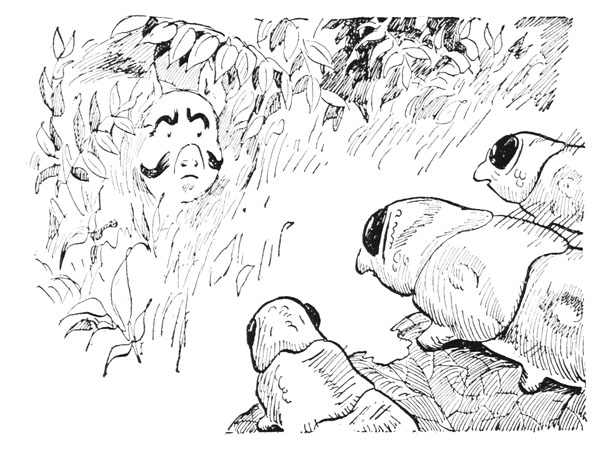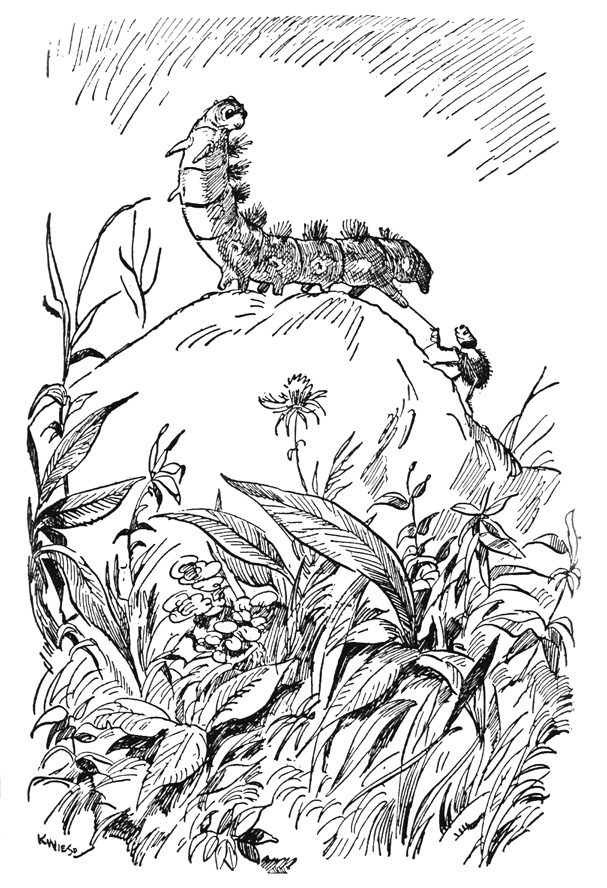

Chapter 8
Aunt Effie hadn’t slept very well that night. First, there had been the mosquito, and then there had been a lot of troublesome thoughts arising out of what had happened at the movie theater. She had been within her rights in demanding that the pig be removed. Nobody would care to have the seat next her occupied by a pig. But the manager had refused to put him out, and the audience had backed him up. It was disgraceful!
The pig had acted well, too. He had not tried to stand on what he evidently thought were his rights. He had been quite gentlemanly, preferring to leave quietly rather than cause a disturbance. Somehow Aunt Effie felt that she had not come out of the encounter very well.
And then the discovery that the pig could talk! That was more disquieting than anything that had happened to her in a long time. She didn’t really believe it, of course; she couldn’t make herself believe it. And yet, if it hadn’t been the pig who spoke, who was it?
She worried all night about these things, and at breakfast she was as cross as two sticks. Uncle Snedeker wanted to talk about what had happened at the theatre, which was quite natural, for if you have really heard an animal say something it makes a good topic of conversation. But Aunt Effie was pretty short with him.
“I do not care to discuss the matter,” she said. “If you wish to talk to pigs you are of course free to do so, but I don’t wish to hear about it.”
“Eh, but it was you that talked to the pig, Effie, not me,” he protested.
“We will not discuss it,” said Aunt Effie. “Snedeker, take your elbows off the table!”
“Eh, I’m sorry, Effie, I’m sorry,” said Uncle Snedeker, hastily drawing back his arms from the cloth. Uncle Snedeker’s manners were usually almost perfect, thanks to Aunt Effie’s training, but once in a while he would forget. It was an unlucky thing for him if he forgot when Aunt Effie happened to be sewing, because then she would rap his head with her thimble, and as he didn’t have much hair, it hurt. This morning she was across the table, so all she could do was glare at him.
Nobody likes to be glared at, particularly when he is eating. Uncle Snedeker got nervous and choked on his coffee, and then he said: “Excuse me,” and rose and went out to get the hay in.
When Aunt Effie had washed up the breakfast dishes, she went into the parlor and sat down in a chair to admire the silver teapot. It was a beautiful teapot. But what good was the most beautiful teapot if there was no one to give tea parties to? “No one but pigs!” she said bitterly. “Talking pigs!”
And at that moment there was a rap at the kitchen door, and she went and opened it and there stood Freddy.
“Excuse me, ma’am,” he said quickly, “but there’s trouble in the garden, and we thought you ought to know.”
Aunt Effie couldn’t seem to find her voice. She just stared.
Freddy explained. And at once Aunt Effie leaped to action. She didn’t even wait to put on her bonnet. She got a hoe and the kerosene can from the woodshed and started for the garden. “Go get Snedeker,” she called over her shoulder.
When Freddy and Uncle Snedeker reached the garden the battle was on in earnest. The beets had already been eaten right down to the ground, and the caterpillars had started on the beans. And in the little space between the first two bean rows, Aunt Effie and Robert and Georgie and the three cows were digging away with hoe and hoofs and paws. Pretty soon they had a trench dug, and Aunt Effie poured kerosene in and lit it. More animals were coming up all the time, but there wasn’t much they could do to help. If they attacked the invaders, they would do more harm than good by trampling down the beans. They stood around in helpful attitudes, and watched the smoky flames run along the trench.
Caterpillars are not very bright, and usually if there is anything between them and what they have decided to eat, they will keep on marching right through it. If it is a trench full of fire they keep on until they are all burnt up. But these caterpillars were better trained. They had learned to obey orders, which is an important thing for anybody to learn, whether he is a caterpillar or a human. So when the officers ran rippling up and down the edge of the trench, shouting: “Column right–march!” the whole army turned as one caterpillar and rolled up along the trench. And in a few minutes they had turned the end of it and were in among the beans and the lettuce and the tomatoes on the other side.
“Another trench!” shouted Aunt Effie, swinging her hoe. “Come along, you animals!” She realized that by the time the other trench was dug it would be too late. Already a dozen of the best tomato plants had been captured, and squads of hungry caterpillars were pushing in among the young corn. But she was not one to give up easily, and the animals followed her willingly.
In the meantime, Mr. Webb, unwilling to remain in idleness when there were deeds to be done, had returned to the battlefield. Not that any deeds he could do would make much difference in the outcome. A few caterpillars tied up and helpless wouldn’t save the garden. But he had an idea. He reached the trench just as the caterpillars abandoned the attempt to storm it and turned to outflank it. He dashed down the bean rows, peering through the smoke that almost stifled him. Now and then a flame, blown by the wind, licked toward him, and he darted back to avoid being burnt. But fortune favors the bold. Standing on a stone and surveying the operations with a satisfied smile, was the head caterpillar.
Mr. Webb also smiled a satisfied smile. Quickly he spun a strand of web, and holding it in his mouth he crept up behind the caterpillar. When he was close enough he jumped, and bit the caterpillar in his third right hind leg, at the same time slipping the loop around it. The caterpillar reared up and half turned around, and Mr. Webb pulled the loop around his first left front leg, quickly jerked it tight, and fastened it. Then he rolled the helpless caterpillar off the stone and after tying a few more of his legs together, hid him under a plantain leaf. “There,” he said, “I guess nobody will rescue you for a while.”

… slipping the loop around it.
Although the caterpillars were deprived of a leader, and although the second trench was nearly dug, so many of them were now in the garden that there was little hope of saving it. Caterpillars are fortunate in one respect; they can eat twenty-four hours a day without ever getting a stomach-ache. And so, although they are small, they eat a great deal. The garden was just disappearing.
As Mr. Webb came out after hiding the leader, he saw that there was some commotion among the caterpillars. Many of them had stopped eating and were staring with lifted heads toward a corner of the garden. One whole regiment, who were now advancing on the cabbages had stopped, and seemed to be thrown into confusion. Mr. Webb climbed up a tomato vine and joined a group of them to see what they were looking at.
“Hey, spider,” said one of the caterpillars, “what kind of an animal is that?” He nodded his head toward a clump of bushes at the edge of the garden, from which a head was peering out.
It was a pretty queer kind of a head. Mr. Webb had never seen anything like it before. It looked like a pig, but it had fierce black moustaches and scowling black eyebrows. It was, of course, Little Weedly, though Mr. Webb didn’t know that. What he did know, though, was that here was a chance to give the caterpillars a good scare.
“Wow!” he said. “You boys better go while the going’s good.”
“What do you mean?” said the caterpillar.
“Just what I say. He eats caterpillars.”
“Go on!” said the caterpillar. “Are you trying to kid me or something? There aren’t any animals that eat caterpillars.”
“Is that so!” said Mr. Webb. “Well, of course, maybe you know best. Go ahead, boys. Tuck into your dinner. Maybe it’s the last one you’ll eat, so don’t waste time talking.”
This seemed to make the caterpillar nervous. “But there aren’t, I tell you,” he insisted. “I guess I ought to know.”
“You ought to,” said the spider, “but you don’t. Remember that circus that was here last year? No, I guess you don’t; you weren’t around here then. Anyway, they had this animal in a cage—at least, I suppose it’s the same animal, for he was the only one in captivity. He must have escaped. I did hear yesterday that some of their animals escaped.”
“Yes, yes,” interrupted the caterpillar impatiently, “but what is he?”
“Oh, didn’t I tell you? The Greater Siberian Caterpillar-Eater. Yes, sir; that’s what they called him. Eats nothing but caterpillars—all kinds. People came from miles around to see him, and some of them—Hey, where you going?” he called, for the caterpillar and his friends had dropped to the ground and were making off as fast as they could go.
In five minutes word had gone through the entire army that a Greater Siberian Caterpillar-Eater was at large and about to attack them. None of the caterpillars had ever heard of such an animal, but that made him even more terrible to them, and as each one added something to the story as he passed it on, in no time at all the whole army, with no leader to rally them, was in a panic-stricken retreat.
“H’m,” said Mr. Webb to himself, “I expect it would be sort of a joke on me if he turned out to be a Greater Siberian Spider eater. I wonder what he really is?” And then Little Weedly came out of the bushes with Jinx beside him. “Why, it’s that Weedly!” said the spider. “Who on earth painted him up like that? Well, I guess I’d better go back and tell mother about the excitement. She’ll be wild, not being in on it.”